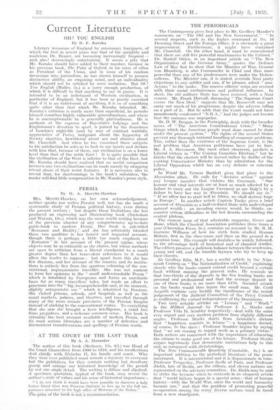. THE PERIODICALS The Contemporary gives first place to Mr.
Geoffrey Mander's comments on The Old and the New Government." " In several respects, such as the higher command at No. 1(1 Downing Street and the Foreign Office, it is obviously a great improvement. Furthermore, it might have contained Mr.. Churchill. On the other hand, it must be remembered that there are still five powerful reactionaries in the Cabinet," Dr. Rudolf Olden, in an important article on " The New Organization of the German Army," quotes the Defence Law of May last to show that the Minister of War, General von Blomberg, is alio Commander in Chief and thus more powerful than any of his predecessors were under the Hohen- zollerns. The Minister can, it is stated, overrule Nazi party objections to any soldier' and can, if be pleases, admit non- Aryans " to the ranks. The reserve officers' corps are revived with their social exclusiveness and political influence. In Short, the old military State has been restored, with a Nazi veneer: 'Mr. Frank Darvall, discussing " The Supreme Court versus the New Deal," suggests that Mr. Roosevelt may yet carry out much of his programme, despite the adverse ruling on a part of it. But he adds that the Court would not have unanimously condemned " N.R.A.," had the judges not known that the measure was unpopular.
Mr. D. W. Brogan, in the Fortnightly, deals with the broader
issues of " The American Constitutional Crisis." " Many things which the American people want done cannot be done under the present system." • The rights of the Several States prevent any thorough national handhng-of economic problems. This, rather than the existence of the Supreme Court, is the real problem that American politicians have yet to face. Mr. J. A. Stevenson, like most other observers, predicts a Liberal victory in "The Coining Canadian Election," but he thinks that the electors will be moved rather by dislike of tie existing Conservative Ministry than' 'by admiration for the Liberal Opposition which has no very definite or coherent 13i olney.
World Mr. Vernon Bartlett gives first place to the Abyssinian affair. He calls for " decisive action " against any League member that violates the Covenant. Our honour and vital interests are at least as much affected by a Pilure to carry. out the League Covenant as are Italy's by a failure to have her way in Abyssinia. 'We 'should say so." If we allow her to start hell in Africa, we shall destroy hope in Europe." In another article Captain Tuohy gives a brief account of Abyssinia as a half-civilized State with undeveloped natural wealth ; an invading enemy would, he thinks, en- counter serious plateau.
nsudifficulties in the hot deserts surrounding the The current issue of that admirable magazine, Greece and
Rome, which the 'Clasiical Association publishes three times a year (Clarendon Press, 3s.), contains an account by Mr. B. H. Caimans Williams of how his sixth form studied Roman Britain, first in the class-room and then on the ground in a vacation tour. His example will doubtless be widely followed. to the advantage both of historical and of classical studie. The editors preserve a judicimis balance between the academies, young and old, and the humble laymen who try to keep up their classics,
,Sir Geoffrey Ellis, M.P., has ,a tiseful article in the Nine-
fienth Century on " The Nationalization of Credit," explaining clearly why the banks cannot extend credit beyond a certain limit without running. the gravest. risks.. He reniinds 'Us that two-thirds of the deposits in the five leading 'banks are personal and professional and that the average deposit in one of these banks is no more than £170. Socialist attack on the banks would thus injure the small man. Mr. Cyril Asquith explains very lucidly the 'significance Of the recent judgement of the Judicial Committee of the Privy COuncil as reaffirming the virtual independence of the Dominions. ' TwO very notable articles on " Leisure " and " Work '
in the Ilibbert journal—by Professor J. L.. Stocks and Profesior Vida b. Scudder respectively-Ldeallwith the same very urgent and very modern problem from slightly different angles. Professor Stocks starts from Aristotle's dictum that " happiness consists in leisure "—a happiness denied, of course, to the slave ; Professor Scudder begins by saying that " we are ceasing to regard work as a primary virtue." Both writers are concerned with the importance of educating the citizen to snake good use of his leisure, Professor Stocks argues ingeniously that democratic institutions help to this
end; as compared with. dictatorships. • The New ComMonwealth Quarterly (Constable, 2s.) is an important addition to the periodical literature of the peace .movement. It is international and it is dispassionate in tone. Professor Temperley, Professor Scene of Paris, and Professor silickh, late of Berlin, are the editors, and eleven nations arc represented on the advisory committee. Dr. Jackhmaybe said
to strike the keynote when he contends in an eloquent article that " world history began in a special sense—that of human history—with the World War, since the world and humanity became one," and that the problem of promoting peaceful co-operation among the many diverse nations must be faced from a new standpoint.














































 Previous page
Previous page